
Fur Fighters is a video game developed by Bizarre Creations and published by Acclaim Entertainment for the Dreamcast in 2000, later for Microsoft Windows. The game was first announced as a Dreamcast exclusive in the January 1999 issue of Electronic Gaming Monthly, having started development in the summer of 1998. It was designed very much as a standard third-person shooter, but used a world populated by cute little animals as its setting. As a result, the game's depiction of violence is very cartoon-like without losing any of its intensity. In 2001, an updated version for the PlayStation 2 was released as Fur Fighters: Viggo's Revenge. On 20 July 2012, members of Muffin Games, ex-Bizarre Creations staff, announced a conversion for iPad, called Fur Fighters: Viggo on Glass.

Virtua Tennis 2, known as Tennis 2K2 in North America and Power Smash 2 in Japan, is a sequel to Virtua Tennis that was released for the Sega Dreamcast, Sega NAOMI arcade unit and Sony's PlayStation 2 in 2001–2002. New features included the ability to slice and play as female players such as Monica Seles, Serena Williams, Venus Williams and Lindsay Davenport and the males such as Patrick Rafter, Magnus Norman, Thomas Enqvist and Carlos Moyá and mixed doubles matches. The game was created and produced by Hitmaker, with Acclaim Entertainment publishing it in Europe for the PS2. This was the last Virtua Tennis game to be released for the Dreamcast following its discontinuation.

18 Wheeler: American Pro Trucker, known in Japan as 18 Wheeler, is an arcade game developed by Sega AM2 and distributed by Sega. The game was released in arcades in 1999 and ported to the Dreamcast in 2000. It was released for the PlayStation 2 in 2001 and GameCube in 2002 by Acclaim Entertainment. Sega followed up on the success of 18 Wheeler with a sequel, The King of Route 66, which was released in the arcades in 2002 and ported to the PlayStation 2. This was one of the final arcade games to be ported to the Dreamcast after its discontinuation, before Sega became a third-party developer.
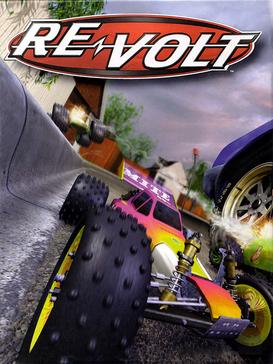
Re-Volt is a racing video game designed by Paul Phippen and Simon Harrison. It was developed by Acclaim Studios London and published by Acclaim Entertainment for Microsoft Windows, Nintendo 64, PlayStation and Dreamcast.
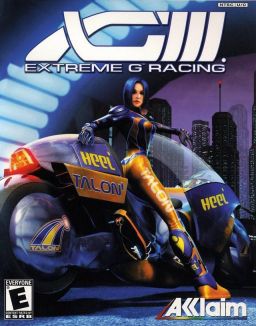
XGIII: Extreme G Racing, also known as Extreme-G 3, is a racing video game developed by Acclaim Studios Cheltenham and published by Acclaim Entertainment for the PlayStation 2 and GameCube. This game serves as a sequel to Extreme-G 2 and is followed by XGRA: Extreme-G Racing Association.

Ultimate Fighting Championship is a set of two video games based on the Ultimate Fighting Championship mixed martial arts promotion. One version was released for home consoles by developer Anchor for Sega Dreamcast in August 2000. This version was ported to PlayStation by Opus in November. A separate version was released for Game Boy Color by developer Fluid Studios in November of the same year. The game was published by Crave Entertainment in North America, by Ubi Soft in Europe, and by Capcom for Dreamcast and PlayStation versions in Japan.

International Track & Field 2000 is a track and field game for PlayStation in 1999 and Nintendo 64 in 2000. It was released in Europe under the names International Track & Field: Summer Games on the Nintendo 64 and Game Boy Color, International Track & Field 2 on the PlayStation and International Track & Field on the PlayStation 2 and in Japan as Ganbare! Nippon! Olympics 2000, where it was licensed by the Japanese Olympic Committee. Versions were also released for the Sega Dreamcast, PlayStation 2, and Game Boy Color as ESPN International Track & Field in North America. Maurice Greene, a former men's WR holder in the 100M dash, is the cover athlete.
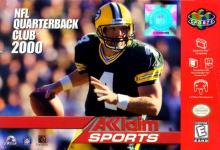
NFL Quarterback Club 2000 is a sports video game developed by Acclaim Studios Austin and published by Acclaim Entertainment for Nintendo 64 and Dreamcast in 1999.

Test Drive 6 is a racing video game developed by Pitbull Syndicate for PlayStation, Microsoft Windows and Dreamcast. In the United States the game was published by Infogrames North America, while in Europe the game was published by Cryo Interactive. The game featured 37 licensed cars, plus four police car variants. As a first for the series, cars from General Motors are not playable in this game, instead they appear as traffic cars. The soundtrack featured industrial rock and techno music from artists such as Fear Factory, Lunatic Calm and Cirrus.

Super Puzzle Bobble, released as Super Bust-A-Move in Europe and North America, is a puzzle video game in the Puzzle Bobble series. It was developed by Taito, and released on November 27, 2000 by Acclaim Entertainment for the PlayStation 2, and by CyberFront and EON Digital Entertainment for Windows in 2001. It was later ported to the Game Boy Advance that same year, the Japanese version under the name Super Puzzle Bobble Advance. It was re-released in Japan for the PlayStation 2 in 2004 as part of Super Puzzle Bobble DX, which is Volume 62 of the Japan-exclusive Simple 2000 Series. This compilation includes a few graphical enhancements.

NBA Hoopz is a 2001 basketball video game published by Midway. It is the sequel to NBA Hangtime and NBA Showtime: NBA on NBC. Hoopz was the only 3-on-3, arcade-style basketball video game available during the 2000–01 NBA season. Shaquille O'Neal is featured on the game cover.

NASCAR Heat 2002, sometimes mislabeled as NASCAR Heat, is a NASCAR video game produced by Infogrames for the Xbox, PlayStation 2, and Game Boy Advance consoles. It is the successor to the 2000 game NASCAR Heat, and the predecessor to NASCAR: Dirt to Daytona. NASCAR Heat 2002 can have up to 24 (PS2) or 43 racers on one of 19 official NASCAR tracks, and the game was released in June 2001 for PlayStation 2. A port for the Xbox was released in November 2001. Developed by Crawfish Interactive, a distinct version for Game Boy Advance was released in May 2002.
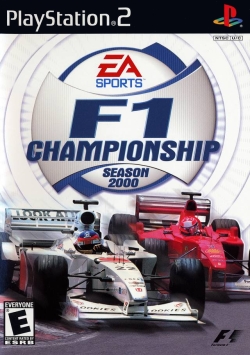
F1 Championship Season 2000 is a racing video game based on the 2000 Formula One season, and was released by EA Sports for PlayStation, Microsoft Windows, PlayStation 2, Game Boy Color, and Mac OS X.

NFL GameDay 2001 is a 2000 American football video game developed by Red Zone Interactive and 989 Sports and published by Sony Computer Entertainment for the PlayStation and the PlayStation 2. On the cover is Marshall Faulk.

Le Mans 24 Hours is a video game released for the PlayStation, Game Boy Color, Dreamcast, PlayStation 2, and Microsoft Windows. The Dreamcast version was ported and published by Sega in Japan on 15 March 2001, while the PlayStation 2 version was ported and published by the same company on 13 June. Based on the famous 24 hours of Le Mans race in France, the player is invited to race the entire 24-hour endurance course or take part in a simpler arcade mode. The game also featured tracks such as Bugatti Circuit, Brno Circuit, Road Atlanta, Suzuka Circuit, Donington Park and Circuit de Catalunya, as well as a weather and night system.

Sno-Cross Championship Racing is an extreme sports video game. It was developed by Unique Development Studios and published by Crave Entertainment.

NCAA GameBreaker 2001 is a 2000 American football video game developed by Red Zone Interactive and 989 Sports and published by Sony Computer Entertainment for the PlayStation and PlayStation 2. It was only released in North America.

ESPN NBA 2Night is a video game developed and published by Konami for Dreamcast and PlayStation 2 in 2000-2001. A sequel, ESPN NBA 2Night 2002, was released in 2002 for the PlayStation 2 and Xbox.
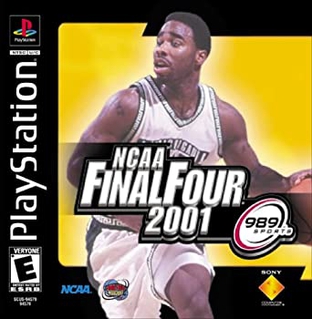
NCAA Final Four 2001 is a 2000 basketball video game developed by Killer Game and published by Sony Computer Entertainment for the PlayStation and PlayStation 2. It is the first installment of the series to not be published by 989 Sports, it becoming a publishing label of Sony.

NHL FaceOff 2001 is an ice hockey video game developed by SolWorks and published by Sony Computer Entertainment for the PlayStation and PlayStation 2. It was released only in North America under 989 Sports. On the cover is then-Toronto Maple Leafs player Curtis Joseph.




















